What is happening in and around the Black Sea and how does it affect NATO?
The Black Sea region is of crucial significance for Europe, being a major crossroads and critical intersection of east-west and south-north corridors. Many experts believe that whoever controls or dominates the Black Sea can easily project power to the European continent, mainly in the Balkans and Central Europe, but also in the Eastern Mediterranean as well as the South Caucasus and the northern Middle East.
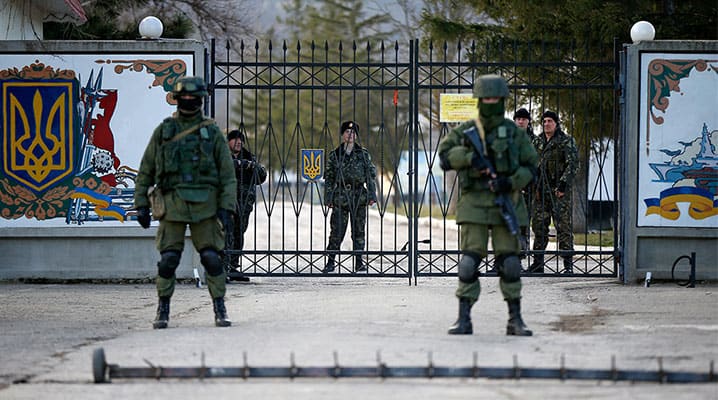
Russian special forces troops in unmarked uniforms stand guard at a Ukrainian military base near Simferopol, which had been surrounded during Russia’s illegal annexation of Crimea in March 2014. © Sovereign Ukraine
The region is home to three NATO members (Bulgaria, Romania and Turkey) and several NATO partner countries, so any instability or hostility in the area directly impacts the Alliance. Russia’s actions were in focus at the NATO Summit in Warsaw in July 2016, when Allied leaders clearly stated that “Russia’s recent activities and policies have reduced stability and security, increased unpredictability, and changed the security environment.”
Over the past few years, Russia has steadily upgraded its military posture and matched it with an uncompromising and assertive information campaign. Most Russia experts consider that Moscow is doing this primarily in pursuit of its strategic objective of great power status and the establishment of zones of privileged influence.
Hard facts support this claim. The latest and probably most serious threats to the European security architecture, openly challenging the established world order, have occurred in the Black Sea region: Russia’s conflict with Georgia in 2008, its illegal annexation of Crimea in 2014 and its continuing destabilising activities in eastern Ukraine. Beyond using conventional military force, Russia is applying asymmetrical means of warfare in this region, aimed at disturbing and incapacitating the nations’ sovereign decisions and their processes of democratisation and Euro-Atlantic integration.
What are the main challenges for NATO?
The challenges to security in the Black Sea region are all interconnected and inextricably intertwined in the wider context of Euro-Atlantic security.Russian military buildup and A2/AD
Anti-Access/Area Denial (A2/AD) is military jargon to describe the situation when a state deploys weapons systems, often with long-range capabilities, to deny foreign forces freedom of movement in the theatre. Land-based surface-to-air missiles, surface-to-surface ballistic or cruise missiles, and anti-ship missiles are the capabilities most often used for building up A2/AD. Additional elements may be added to the system – for example, advanced aircrafts, surface ships and submarines, and their capabilities for air superiority and for control of the seas. Enhanced communications and surveillance systems and cyber warfare capabilities also contribute to this comprehensive A2/AD network, which will try to disrupt the electromagnetic spectrum and deprive foreign forces of its use.
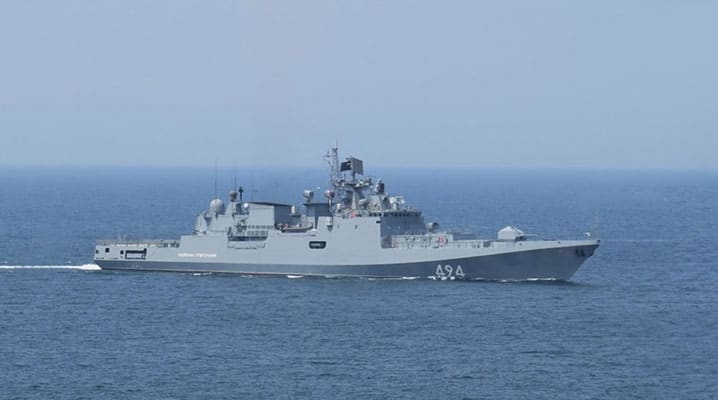
Russian Frigate Admiral Grigorovich RFS-494 is the latest class of frigates ordered by the Russian Navy for the Black Sea. © YouTube
It is not the A2/AD concept that is new. But the deployment of substantial amounts of this new military equipment raises questions about the purpose and intentions hidden behind Russia’s buildup. As early as 2010, the Russian State Armaments Programme prioritised the Black Sea Fleet for a significant capability upgrade. In 2015 and 2016, the Black Sea Fleet received the first of six planned upgraded KILO-class submarines and the first of six planned Admiral Grigorivich class frigates. They added to the sophisticated A2/AD system with their long-range anti-ship missiles as well as the long-range land-attack cruise missiles.
Russian malign influence
A number of NATO member states and non-governmental organisations have been vocal and candid about Russia’s malign activities which aim to erode democratic institutions by exploiting the features of open economies and societies. Numerous reports describe the toolbox and options Russia is using for this. Among the most visible actions is the active propaganda campaign, which aims to create new or reignite old historic issues which make cooperation in the region less likely, while at the same time undermining trust in Euro-Atlantic institutions – including both NATO and the European Union.
As a result, the entire region, down to each individual country, is weaker, less open for integration and dangerously prone to subversion. A regular instrument of choice is the spread of fake news and conspiracy theories, many of which suggest a hidden Western agenda. More often the aim is to fuel anti-establishment grievances, including direct support for political parties with anti-NATO agendas and anti-European agendas, feeding Euro-skepticism at large. A recent trend reveals efforts to further polarise societies that have already shown signs of division over the question of immigration or liberal democratic values.
Protracted conflicts
Post-Soviet protracted (often called ‘frozen’) conflicts are all concentrated in the Black Sea region. They create ‘grey zones’ that potentially could or are already fueling organised crime, smuggling and radicalization. It requires little effort to see how Russia exploits all of them for political intimidation of the newly independent states of the former Soviet Union.
For NATO this is clearly a challenge, since all those conflicts have significant potential to destabilise the whole region rapidly. The EU’s Global Strategy, adopted in 2016, also identifies the protracted conflicts in the Black Sea region as a challenge “to the European security order”.
Energy (in)security
As the Black Sea is a key transit corridor for energy resources, a major issue is the security of supply. The existing security environment also raises concerns about the ability to exploit fossil fuels in littoral waters. At the same time, the interdependence of gas imports creates unavoidable political implications, and these imports are easily used for political purposes. Still, the European Union’s members and other nations have taken steps to address this issue, and the natural gas market is beginning to resemble the oil market, where price – rather than location – determines transactions. Of course, there is high need of connectivity among local gas networks in Europe.
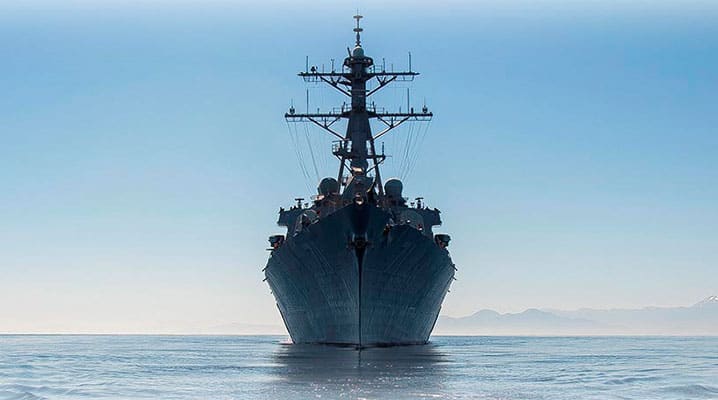
The Arleigh Burke-class guided-missile destroyer USS Ross (DDG 71) leaves the Black Sea, after conducting maritime security operations and enhancing regional maritime stability, as well as strengthening combined readiness and naval capability among NATO Allies and partners – 28 February 2018. © US Naval Forces Europe-Africa / US 6th Fleet
Security of lines of communication
For millennia, the Black Sea region has been an intersection of communication lines between Europe and the Middle East, from the Eastern Balkans to the South Caucasus. The security of these lines of communication is crucial for trade and prosperity in the region and beyond. In this context, it is obvious that the current instability chokes economic development and potential in the region, which sea trade and closer economic integration could uncap.
What is NATO’s response?
NATO had made it clear on numerous occasions that the Alliance had no intention to deploy forces in the east or southeast of Europe. However, Russia’s illegal annexation of Crimea triggered the Alliance to deliver on its core task – collective defence – and ensure its credibility. Steps have been taken to strengthen NATO’s presence in the Black Sea region, which are a defensive and proportionate response to Russia’s use of military force against its Black Sea neighbours. At the same time, Allies have agreed to keep open channels of communication with Russia, demonstrating their will to ensure predictability and transparency.
The dual track approach
The Black Sea region is the south-eastern flank of the Alliance. In light of the regional realities and security challenges, NATO has strengthened its deterrence and defence posture with tailored forward presence measures. These are a peacetime demonstration of NATO’s resolve to ensure effective deterrence and credible collective defence.
The tailored forward presence measures include a land component – a multinational framework brigade for integrated training – as well as measures for strengthened air and maritime presence in the region.
Among the measures announced, the following have already been developed:
- The multinational brigade in Craiova, for which Romania is a framework nation, forms the land component of the forward presence. Currently ten Allies – Bulgaria, Canada, Germany, Spain, Hungary, Italy, Luxembourg, the Netherlands, Poland and Portugal – have committed to it, contributing to the brigade headquarters and coordinating enhanced training.
- In the air domain, Canada and Italy are reinforcing the efforts of Romania and Bulgaria for air policing.
- In the maritime domain, standing NATO maritime forces are present with more ships and more naval exercises. A Black Sea functional centre has been established within the NATO Maritime Command, which focuses on the regional specific security issues and maintains tight links with the regional navies.
- Last, but not least, a new enhanced training initiative aims to bring more coherence in all training efforts.
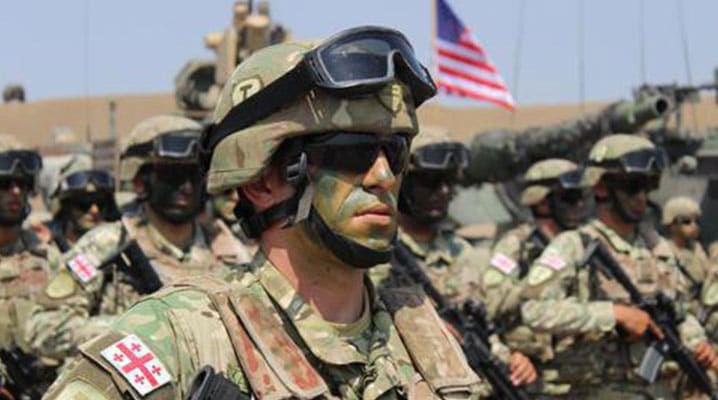
More than 1500 soldiers from Azerbaijan, Bulgaria, Georgia, Latvia, Romania, Ukraine and the United States take part in Agile Spirit 2017, a series of multinational military exercises at the Orfolo training ground in the Samtskhe-Javakheti region of Georgia – September 2017. © Caucasian Knot
In light of the new Russian military posture and notwithstanding the deterrence and defence posture that NATO has developed in response, the Alliance and its leaders are committed to pursuing a dual track approach. As agreed at the Warsaw Summit, while strengthening deterrence and defence capabilities, the Alliance remains open to focused and meaningful dialogue with Russia on the basis of reciprocity. The NATO-Russia Council has met six times since April 2016, providing opportunities for the Allies to openly discuss with Russia issues related to military activities, transparency and risk reduction.
Projecting stability and engaging with partners
At the Warsaw Summit, Allied leaders stated that more stable NATO neighbours means more security for the Alliance and that “...against the background of increasingly unstable global security environment… NATO seeks to contribute more to the efforts of the international community in projecting stability and strengthening security outside its territory, thereby contributing to Alliance security overall.”
To achieve this, Allies have strengthened their focus on areas of increased risk and are engaging with partners in the Black Sea region with the entire spectrum of instruments in their cooperative security toolbox. This includes regular consultations on the strategic assessment of the security situation in the Black Sea region, planning for relevant exercises, and accelerated practical support for Georgia, Moldova and Ukraine.
NATO has stood firmly on its position of non-recognition of Russia’s illegal annexation of Crimea, which was reiterated during the North Atlantic Council visit to Kyiv in July 2017. In addition to its political support, NATO has increased significantly its practical support for Ukraine, providing tailored assistance to support reform in its security and defence sector as well as to develop capability and capacity through a Comprehensive Assistance Package agreed at the Warsaw Summit. Some of the elements of this package are directly related to Black Sea security. For instance, through a regional airspace security project, Ukraine will improve its ability to handle air security incidents. Other projects aim at enhancing Ukraine’s capabilities for secure command and control and situational awareness. NATO is also contributing to the development of Ukraine’s Maritime Academy, which was moved to Odessa following Russia’s illegal annexation of Crimea.
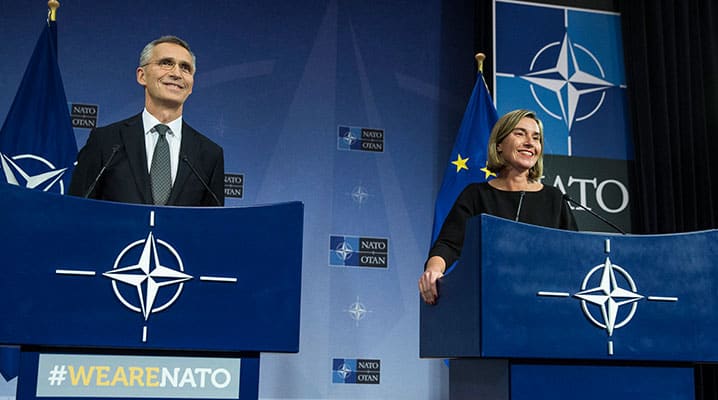
Common challenges to the east and south have prompted NATO and the European Union to strengthen cooperation significantly over the past few years. © NATO
Georgia is one of NATO’s Enhanced Opportunities Partners, which allows for extensive political and practical interaction. Furthermore, the Substantial NATO-Georgia Package of cooperation in the area of defence capacity building, launched at the NATO Summit in Wales 2014, has been evolving to match negative security developments in the Black Sea region. The package includes support for 13 areas, encompassing all three military services. It involves strategic level advice and liaison, defence capacity building and training activities, and multinational exercises.
NATO’s engagement with the Moldova has also been stepped up, at the government’s request, to support defence institution building and reforms. A Defence Capacity Building Package was agreed at the Wales Summit, and a NATO Liaison Office was established in Chisinau at the end of 2017.
Could more be done to enhance security in the region?
NATO has the political clout of its 29 member states and the most advanced defence capabilities at its disposal for the collective defence of each of its members. It is lending political support to its partners as well as helping them build sound defence institutions that generate the capacity to protect their national sovereignty.
Still NATO has certain limitations. In particular, it is proving challenging to adapt and respond to hybrid tactics and threats, analysing Russian malign operations in detail. Such activities lie on edge of traditional warfare but still outside of the defence domain. Therefore it is the responsibility of each nation to develop its institutional and societal resilience to counter such tactics.
However, NATO has a natural partner that can bring a lot of added value to addressing all of the above-mentioned challenges – the European Union. Twenty-two NATO Allies are also members of the European Union. So it is natural for both organisations to work together to promote the development of the Black Sea region and address its security challenges. Indeed, the two organisations have agreed to strengthen cooperation in light of common challenges to the east and south, including countering hybrid threats, enhancing resilience, defence capacity building, cyber defence, maritime security, and exercises. In particular, the European Union can add value by promoting democracy and good governance – this is the basic fundament to achieve durable and long-term stability in the Black Sea region.
